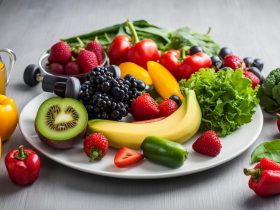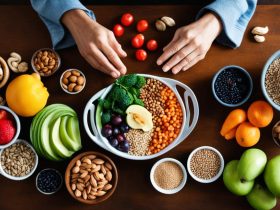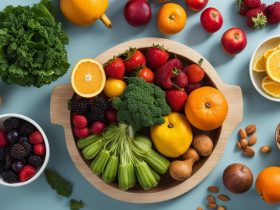You’ve just finished an intense workout, feeling the burn and breaking a sweat. But did you know that what you eat after your workout is just as important as the exercise itself? According to recent studies, muscle recovery and repair can be enhanced by consuming the right post-workout meals. The food you choose can make a significant impact on your body’s ability to replenish glycogen stores, decrease muscle protein breakdown, and increase muscle protein synthesis.
So, what are the best foods to include in your post-workout meal? Let’s explore the science behind post-workout nutrition and discover the optimal meals that can support your muscle recovery and boost your fitness results.
Key Takeaways:
- The nutrients you consume after exercise play a crucial role in muscle recovery and repair.
- Combining carbohydrates and protein in your post-workout meal can help replenish glycogen stores and stimulate muscle protein synthesis.
- The timing of your post-workout meal is important, with experts recommending consumption within a few hours of exercise.
- Some examples of post-workout foods include sweet potatoes, quinoa, chicken, Greek yogurt, and avocado.
- By prioritizing post-workout nutrition, you can optimize your fitness results and promote healthy eating habits.
The Importance of Post-Workout Nutrition
After a workout, your body needs the right nutrients to rebuild glycogen stores, repair muscle proteins, and stimulate new muscle growth. Consuming protein, carbs, and fat in the right ratios is crucial for optimal recovery.
Protein helps repair and build muscle, with 20-40 grams recommended every 3 to 4 hours. It plays a critical role in reducing muscle protein breakdown and promoting muscle synthesis, leading to muscle growth and repair. Including quality sources of protein such as lean meats, fish, dairy products, and plant-based options like tofu and legumes can support your post-workout recovery.
Carbs are essential for replenishing glycogen stores, which are the primary fuel source for high-intensity workouts. Consuming carbs after exercise helps restore energy levels and supports rapid recovery. It is recommended to consume a ratio of 3 grams of carbs to 1 gram of protein for optimal glycogen replenishment.
The role of fat in post-workout nutrition is still debatable, with more research needed to determine its effects on recovery. While some studies suggest that incorporating healthy fats like avocado, nuts, and olive oil in post-workout meals may enhance nutrient absorption and promote overall recovery, the specific impact of fat on muscle repair and growth requires further investigation.
Understanding the importance of nutrient timing is also crucial. Consuming a well-balanced post-workout meal or snack within a few hours of exercise can maximize the benefits of post-exercise nutrition. It provides your body with the necessary resources to kickstart the recovery process and optimize muscle adaptation.
By prioritizing post-workout nutrition and focusing on consuming the right nutrients in the proper ratios, you can support your body’s recovery process, promote muscle growth, and enhance overall performance.
Timing Your Post-Workout Meal
The timing of your post-workout meal is crucial for optimizing recovery and promoting muscle adaptation. While it was once believed that consuming a combination of carbohydrates and protein within 30 minutes of exercise was most beneficial, recent research suggests that the post-exercise window may be wider.
Experts now recommend eating a well-balanced meal or snack within a few hours of completing your workout to support glycogen synthesis, nutrient timing, and the recovery period. This approach ensures that your body has the necessary fuel and building blocks for muscle repair and growth.
Pre-Workout Nutrition and Its Impact on Recovery
Interestingly, pre-workout nutrition may also play a role in post-workout recovery. Consuming a meal rich in carbohydrates and protein before your exercise session can provide a sustained source of energy and promote glycogen storage in the muscles.
Studies have shown that the benefits of a pre-workout meal can extend into the recovery period, as the nutrients remain available for utilization during the post-exercise phase. By strategically timing your pre-workout meal, you can enhance the effectiveness of your post-workout nutrition and optimize your recovery process.
To take full advantage of nutrient timing, consider consuming a pre-workout meal that includes a combination of complex carbohydrates and lean protein sources. Examples of suitable pre-workout options include oatmeal with Greek yogurt and berries, a chicken and brown rice stir-fry, or a whole-grain wrap with turkey and veggies.
By fueling your body adequately before and after your workout, you can support glycogen synthesis, optimize nutrient timing, and promote a faster recovery and muscle adaptation.
Benefits of Timing Your Post-Workout Meal
| Benefits | |
|---|---|
| Maximizes glycogen synthesis | |
| Facilitates muscle repair and growth | |
| Promotes optimal nutrient absorption | |
| Enhances recovery and adaptation |
Timing your post-workout meal is a key component of your overall nutrition strategy for maximizing recovery. By selecting nutrient-rich foods and properly timing your meals, you can replenish glycogen stores, support muscle repair, and optimize your fitness gains.
Best Post-Workout Foods for Recovery
Choosing the right foods for your post-workout meal is crucial for promoting muscle recovery and growth. After a strenuous workout, your body needs nutrients that aid in muscle repair and replenish energy stores. By incorporating these post-workout foods into your diet, you can enhance your recovery process and maximize the benefits of your exercise routine.
Easily digested foods that provide essential nutrients are ideal choices for post-workout meals. Sweet potatoes are an excellent source of complex carbohydrates, which help replenish glycogen stores and provide sustained energy. Quinoa, a complete protein, contains all nine essential amino acids necessary for muscle repair and growth.
Protein-rich foods such as eggs, Greek yogurt, and salmon help rebuild and repair muscles. Consuming these foods after exercise assists in muscle recovery by providing the necessary amino acids for protein synthesis. Additionally, chocolate milk is a great post-workout beverage choice as it contains both carbohydrates and protein, aiding in nutrient absorption and muscle replenishment.
The inclusion of fruits and rice in your post-workout meal provides easily digestible carbohydrates, promoting faster glycogen synthesis. Fruits also deliver essential vitamins and minerals that support overall muscle recovery and health.
Hydration is equally important for optimal recovery. Replenishing fluids lost during exercise is crucial for maintaining performance and preventing dehydration. Drinking water or an electrolyte drink restores hydration levels and supports proper muscle function.
Remember, the best post-workout foods for recovery are those that contain the right balance of carbohydrates and protein. Optimal nutrient absorption and muscle repair depend on consuming a well-rounded meal or snack within a few hours after your workout.
By making informed choices about your post-workout nutrition, you can ensure that your body receives the necessary nutrients to recover effectively and support muscle growth. Incorporate a variety of nutrient-rich foods into your post-workout meals to provide your body with the fuel it needs to optimize performance and achieve your fitness goals.
Sample Post-Workout Meals and Snacks
Creating balanced post-workout meals and snacks doesn’t have to be complicated. By choosing the right combination of recovery meals, rich in protein, carbohydrates, and healthy fats, you can effectively replenish glycogen stores and promote muscle repair.
Here are some examples of post-workout meals and snacks that can aid in muscle recovery:
- Grilled chicken with roasted vegetables and rice: This meal provides a generous amount of protein from the grilled chicken, essential for muscle repair, along with a serving of carbohydrates from the rice to replenish glycogen stores. The roasted vegetables add micronutrients to support overall recovery.
- Egg omelet with avocado spread on whole-grain toast: The combination of eggs and avocado provides a good source of protein and healthy fats, while the whole-grain toast offers complex carbohydrates to restore energy levels.
- Salmon with sweet potato: Salmon is rich in omega-3 fatty acids, which play a role in reducing muscle inflammation and promoting recovery. Pairing it with a sweet potato adds carbohydrates and dietary fiber to aid in replenishing glycogen stores.
- Tuna salad sandwich: Tuna is an excellent source of lean protein, and when combined with whole-grain bread, it offers a balance of macronutrients. Adding vegetables such as lettuce and tomato provides additional vitamins and minerals.
- Oatmeal with whey protein, banana, and almonds: This breakfast option is packed with carbohydrates, protein, and healthy fats. Oats are a great source of complex carbs, while whey protein, banana, and almonds contribute to muscle repair and replenishment of nutrients.
- Pita with hummus: Whole-grain pita paired with hummus provides a combination of carbohydrates, protein, and healthy fats. Hummus, made from chickpeas, offers both protein and dietary fiber, supporting post-workout recovery.
These sample post-workout meals and snacks are designed to provide a well-rounded nutritional profile to support muscle repair and replenish glycogen stores. Remember to drink plenty of water or an electrolyte beverage to stay hydrated and support overall recovery.
Conclusion
Proper post-workout nutrition is vital for promoting muscle recovery, repair, and growth. By consuming the right balance of carbohydrates, protein, and fats, you can effectively replenish glycogen stores, reduce muscle protein breakdown, and stimulate muscle protein synthesis. It is crucial to time your post-workout meal within a few hours of exercise to optimize recovery.
Choosing nutrient-rich foods is key to supporting muscle recovery. Incorporating options such as sweet potatoes, quinoa, chicken, Greek yogurt, and avocado can provide the necessary nutrients for optimal post-workout recovery. Additionally, staying adequately hydrated with water or an electrolyte drink is essential to restore fluids lost during exercise.
By prioritizing post-workout nutrition, you can enhance your fitness journey and establish healthy eating habits. Fueling your body with the right nutrients after a workout not only aids in muscle recovery but also contributes to overall fitness and well-being. Remember, post-workout nutrition is a crucial component of your fitness routine that should not be overlooked. So, make it a priority and reap the benefits of a well-nourished body.
FAQ
What nutrients are important for post-workout recovery?
Consuming a combination of carbs and protein is crucial for muscle recovery and repair.
How much protein should I consume after a workout?
Experts recommend consuming 20-40 grams of protein every 3 to 4 hours for optimal recovery.
Do carbs play a role in post-workout recovery?
Yes, carbs replenish glycogen stores and are essential for rapid recovery. A ratio of 3 to 1 (carbs to protein) is suggested for optimal results.
Is fat necessary in post-workout nutrition?
The effects of fat on recovery are still debated, and more research is needed to determine its impact.
When is the best time to eat after a workout?
While consuming a combination of carbs and protein within 30 minutes was once recommended, recent research suggests that the post-exercise window may be wider. Eating a well-balanced meal or snack within a few hours of exercise is still beneficial for recovery.
Does pre-workout nutrition affect post-workout recovery?
Yes, a meal rich in carbs and protein before exercise may have benefits that extend into the recovery period.
What are some examples of post-workout foods?
Examples of easily digested post-workout foods include sweet potatoes, chocolate milk, quinoa, fruits, rice, eggs, Greek yogurt, and salmon.
Can you suggest some balanced post-workout meals or snacks?
Some examples include grilled chicken with roasted vegetables and rice, an egg omelet with avocado spread on whole-grain toast, salmon with sweet potato, tuna salad sandwich, oatmeal with whey protein, banana, and almonds, and pita with hummus.
Why is proper post-workout nutrition important?
Consuming the right nutrients helps with muscle recovery, repair, and growth. It replenishes glycogen stores, decreases muscle protein breakdown, and stimulates muscle protein synthesis, optimizing fitness results.
Source Links
- https://www.healthline.com/nutrition/eat-after-workout
- https://www.menshealth.com/nutrition/a19546508/best-post-workout-foods/
- https://www.osmifw.com/eating-for-post-workout-recovery/
Related Articles
Optimize Your Gym Time: Post-Workout Recovery Tips
Balanced Diet for Strength Training: What to Eat for Muscle Gain
Effective Tips on How to Lose Belly Fat Fast: Learn More Today!
Muscle Recovery Tips After Weightlifting Secrets
“Fueling Your Fitness: Essential Nutrition Tips for Athletes”










Leave a Reply